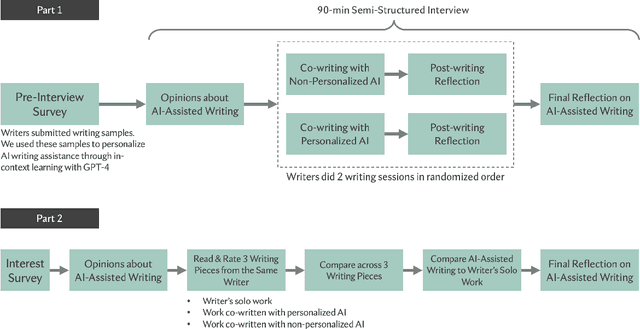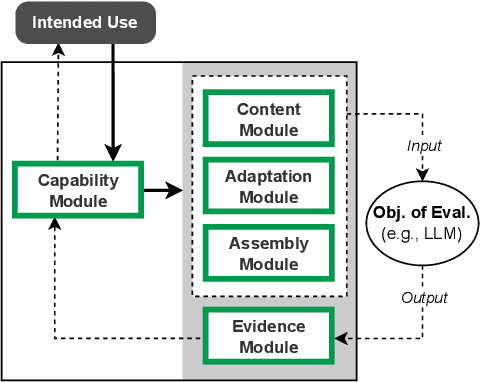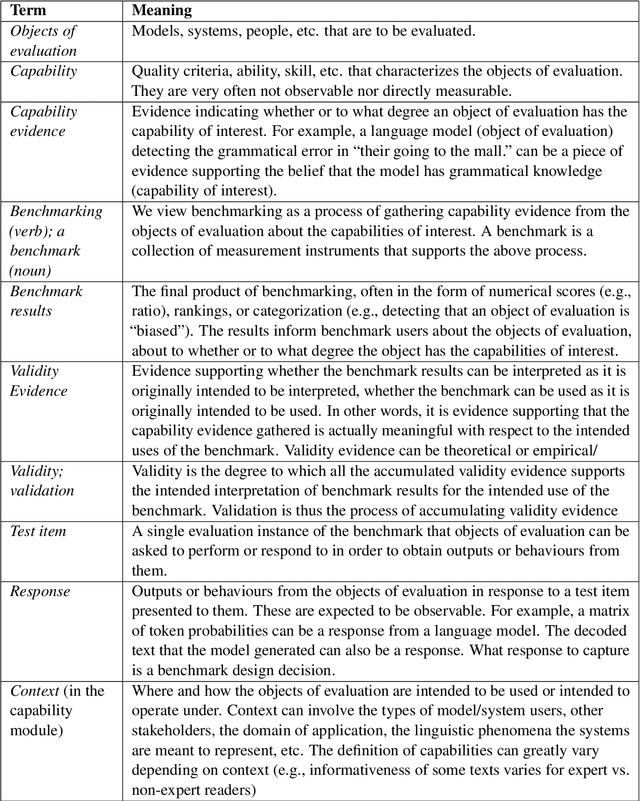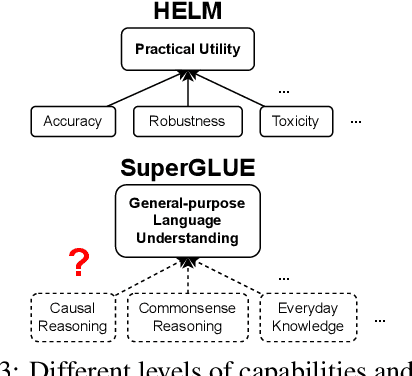Alexandra Olteanu
Rigor in AI: Doing Rigorous AI Work Requires a Broader, Responsible AI-Informed Conception of Rigor
Jun 17, 2025Abstract:In AI research and practice, rigor remains largely understood in terms of methodological rigor -- such as whether mathematical, statistical, or computational methods are correctly applied. We argue that this narrow conception of rigor has contributed to the concerns raised by the responsible AI community, including overblown claims about AI capabilities. Our position is that a broader conception of what rigorous AI research and practice should entail is needed. We believe such a conception -- in addition to a more expansive understanding of (1) methodological rigor -- should include aspects related to (2) what background knowledge informs what to work on (epistemic rigor); (3) how disciplinary, community, or personal norms, standards, or beliefs influence the work (normative rigor); (4) how clearly articulated the theoretical constructs under use are (conceptual rigor); (5) what is reported and how (reporting rigor); and (6) how well-supported the inferences from existing evidence are (interpretative rigor). In doing so, we also aim to provide useful language and a framework for much-needed dialogue about the AI community's work by researchers, policymakers, journalists, and other stakeholders.
Understanding and Meeting Practitioner Needs When Measuring Representational Harms Caused by LLM-Based Systems
Jun 04, 2025Abstract:The NLP research community has made publicly available numerous instruments for measuring representational harms caused by large language model (LLM)-based systems. These instruments have taken the form of datasets, metrics, tools, and more. In this paper, we examine the extent to which such instruments meet the needs of practitioners tasked with evaluating LLM-based systems. Via semi-structured interviews with 12 such practitioners, we find that practitioners are often unable to use publicly available instruments for measuring representational harms. We identify two types of challenges. In some cases, instruments are not useful because they do not meaningfully measure what practitioners seek to measure or are otherwise misaligned with practitioner needs. In other cases, instruments - even useful instruments - are not used by practitioners due to practical and institutional barriers impeding their uptake. Drawing on measurement theory and pragmatic measurement, we provide recommendations for addressing these challenges to better meet practitioner needs.
Dehumanizing Machines: Mitigating Anthropomorphic Behaviors in Text Generation Systems
Feb 19, 2025Abstract:As text generation systems' outputs are increasingly anthropomorphic -- perceived as human-like -- scholars have also raised increasing concerns about how such outputs can lead to harmful outcomes, such as users over-relying or developing emotional dependence on these systems. How to intervene on such system outputs to mitigate anthropomorphic behaviors and their attendant harmful outcomes, however, remains understudied. With this work, we aim to provide empirical and theoretical grounding for developing such interventions. To do so, we compile an inventory of interventions grounded both in prior literature and a crowdsourced study where participants edited system outputs to make them less human-like. Drawing on this inventory, we also develop a conceptual framework to help characterize the landscape of possible interventions, articulate distinctions between different types of interventions, and provide a theoretical basis for evaluating the effectiveness of different interventions.
"It was 80% me, 20% AI": Seeking Authenticity in Co-Writing with Large Language Models
Nov 20, 2024



Abstract:Given the rising proliferation and diversity of AI writing assistance tools, especially those powered by large language models (LLMs), both writers and readers may have concerns about the impact of these tools on the authenticity of writing work. We examine whether and how writers want to preserve their authentic voice when co-writing with AI tools and whether personalization of AI writing support could help achieve this goal. We conducted semi-structured interviews with 19 professional writers, during which they co-wrote with both personalized and non-personalized AI writing-support tools. We supplemented writers' perspectives with opinions from 30 avid readers about the written work co-produced with AI collected through an online survey. Our findings illuminate conceptions of authenticity in human-AI co-creation, which focus more on the process and experience of constructing creators' authentic selves. While writers reacted positively to personalized AI writing tools, they believed the form of personalization needs to target writers' growth and go beyond the phase of text production. Overall, readers' responses showed less concern about human-AI co-writing. Readers could not distinguish AI-assisted work, personalized or not, from writers' solo-written work and showed positive attitudes toward writers experimenting with new technology for creative writing.
"I Am the One and Only, Your Cyber BFF": Understanding the Impact of GenAI Requires Understanding the Impact of Anthropomorphic AI
Oct 11, 2024Abstract:Many state-of-the-art generative AI (GenAI) systems are increasingly prone to anthropomorphic behaviors, i.e., to generating outputs that are perceived to be human-like. While this has led to scholars increasingly raising concerns about possible negative impacts such anthropomorphic AI systems can give rise to, anthropomorphism in AI development, deployment, and use remains vastly overlooked, understudied, and underspecified. In this perspective, we argue that we cannot thoroughly map the social impacts of generative AI without mapping the social impacts of anthropomorphic AI, and outline a call to action.
ECBD: Evidence-Centered Benchmark Design for NLP
Jun 13, 2024



Abstract:Benchmarking is seen as critical to assessing progress in NLP. However, creating a benchmark involves many design decisions (e.g., which datasets to include, which metrics to use) that often rely on tacit, untested assumptions about what the benchmark is intended to measure or is actually measuring. There is currently no principled way of analyzing these decisions and how they impact the validity of the benchmark's measurements. To address this gap, we draw on evidence-centered design in educational assessments and propose Evidence-Centered Benchmark Design (ECBD), a framework which formalizes the benchmark design process into five modules. ECBD specifies the role each module plays in helping practitioners collect evidence about capabilities of interest. Specifically, each module requires benchmark designers to describe, justify, and support benchmark design choices -- e.g., clearly specifying the capabilities the benchmark aims to measure or how evidence about those capabilities is collected from model responses. To demonstrate the use of ECBD, we conduct case studies with three benchmarks: BoolQ, SuperGLUE, and HELM. Our analysis reveals common trends in benchmark design and documentation that could threaten the validity of benchmarks' measurements.
Responsible AI Research Needs Impact Statements Too
Nov 20, 2023Abstract:All types of research, development, and policy work can have unintended, adverse consequences - work in responsible artificial intelligence (RAI), ethical AI, or ethics in AI is no exception.
Responsible AI Considerations in Text Summarization Research: A Review of Current Practices
Nov 18, 2023



Abstract:AI and NLP publication venues have increasingly encouraged researchers to reflect on possible ethical considerations, adverse impacts, and other responsible AI issues their work might engender. However, for specific NLP tasks our understanding of how prevalent such issues are, or when and why these issues are likely to arise, remains limited. Focusing on text summarization -- a common NLP task largely overlooked by the responsible AI community -- we examine research and reporting practices in the current literature. We conduct a multi-round qualitative analysis of 333 summarization papers from the ACL Anthology published between 2020-2022. We focus on how, which, and when responsible AI issues are covered, which relevant stakeholders are considered, and mismatches between stated and realized research goals. We also discuss current evaluation practices and consider how authors discuss the limitations of both prior work and their own work. Overall, we find that relatively few papers engage with possible stakeholders or contexts of use, which limits their consideration of potential downstream adverse impacts or other responsible AI issues. Based on our findings, we make recommendations on concrete practices and research directions.
"One-size-fits-all"? Observations and Expectations of NLG Systems Across Identity-Related Language Features
Oct 23, 2023Abstract:Fairness-related assumptions about what constitutes appropriate NLG system behaviors range from invariance, where systems are expected to respond identically to social groups, to adaptation, where responses should instead vary across them. We design and conduct five case studies, in which we perturb different types of identity-related language features (names, roles, locations, dialect, and style) in NLG system inputs to illuminate tensions around invariance and adaptation. We outline people's expectations of system behaviors, and surface potential caveats of these two contrasting yet commonly-held assumptions. We find that motivations for adaptation include social norms, cultural differences, feature-specific information, and accommodation; motivations for invariance include perspectives that favor prescriptivism, view adaptation as unnecessary or too difficult for NLG systems to do appropriately, and are wary of false assumptions. Our findings highlight open challenges around defining what constitutes fair NLG system behavior.
Investigating Failures to Generalize for Coreference Resolution Models
Mar 16, 2023



Abstract:Coreference resolution models are often evaluated on multiple datasets. Datasets vary, however, in how coreference is realized -- i.e., how the theoretical concept of coreference is operationalized in the dataset -- due to factors such as the choice of corpora and annotation guidelines. We investigate the extent to which errors of current coreference resolution models are associated with existing differences in operationalization across datasets (OntoNotes, PreCo, and Winogrande). Specifically, we distinguish between and break down model performance into categories corresponding to several types of coreference, including coreferring generic mentions, compound modifiers, and copula predicates, among others. This break down helps us investigate how state-of-the-art models might vary in their ability to generalize across different coreference types. In our experiments, for example, models trained on OntoNotes perform poorly on generic mentions and copula predicates in PreCo. Our findings help calibrate expectations of current coreference resolution models; and, future work can explicitly account for those types of coreference that are empirically associated with poor generalization when developing models.
 Add to Chrome
Add to Chrome Add to Firefox
Add to Firefox Add to Edge
Add to Edge